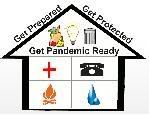# 2612
It is New Year's Day here on the East Coast of the United States, I'm up and the coffee is brewing, and it is just barely 8am. Doesn't say much for my New Year's Eve revelry, of course.
In my youth, there were a couple of times I wasn't up and about until the afternoon of the 3rd. . . but I digress . . .
Today is the day that many columnists and bloggers look back over the year that has passed, and select highlights (or low-lights) to remember.
While we (thankfully) saw no pandemic in 2008, there were enough stories and issues that I managed to blog more than 1175 times.
So something must have happened. Right?
And, in fact, some things did. In broad brushes, and in no particular order, in 2008 we saw:
- The WHO confirmed 40 new human cases of H5N1 infection around the world, with 30 deaths - but many believe that doesn't tell the whole story. Testing for the virus has always been difficult, and in many parts of the world, testing isn't done at all. Additionally, some nations have been slow to report cases, fearing the negative economic impact of doing so.
- The true number of new cases - while likely small - is both unknown, and unknowable.
- The acceptance by the WHO and other health organizations that limited human-to-human transmission of the H5N1 virus has likely occurred in places like Indonesia, China, and Pakistan.
- The rapid emergence of oseltamivir resistant H1N1 seasonal flu, first detected in Norway and Northern Europe in late 2007, but expanding in scope and range during 2008. Thus far, the H5 viruses remain sensitive to Tamiflu - as do the H3 seasonal strains.
- The growing realization that it was probably secondary bacterial pneumonia, not a `cytokine storm', that made the 1918 pandemic so deadly. There are conflicting studies on this, so the jury is still out.
- The long-running and frustrating tug-of-war between Indonesia and the World Health Organization over the sharing of virus samples from that nation entered its third year, and no resolution is in sight.
- Large-scale outbreaks of bird flu in poultry in both India and South Korea, nations that up until 2008, had managed to quickly contain earlier incidents and keep them from spreading. And in places like Indonesia and Egypt, where the virus is endemic, outbreaks in poultry are so common that they rarely warrant news coverage.
- Strong recommendations by the US government (HHS and CDC ) that private businesses, individuals, and families must prepare for a pandemic - including very specific recommendations on the purchase, stockpiling and use of facemasks and antivirals.
- A new willingness of governments to consider deploying a pre-pandemic vaccine before a pandemic starts - particularly when the choice is to use them, or lose them due to upcoming expiration dates. In japan, more than 6,000 medical volunteers have received a pre-pandemic vaccine, and early in 2009, more than a million others are expected to follow suit.
- A reaffirmation by scientists that it may not be the H5N1 virus that sparks the next pandemic; that there are many other candidates out there, waiting in the wings for the right opportunity.
There are other influenza viruses out there, circulating, swapping bits of genetic material, and mutating. The H7s and H9 viruses are also considered to have pandemic potential, although they currently produce less severe illness than the H5 viruses.
Over the past 30 years, we've seen more than 30 new (or at least previously unrecognized) emerging infectious diseases. Diseases like Nipah, Hendra, Hanta . . .
In 2008 alone, we've seen the emergence of a new form of Ebola in Uganda, a previously unseen arenavirus in South Africa, and the apparent nosocomial transmission of HGA (Human Granulocytic Anaplasmosis) - normally a tick borne disease- to 9 healthcare workers in China.
Old scourges, such as Polio, Tuberculosis, Cholera, Dengue, and even Bubonic Plague have re-emerged around the world. Some of these pathogens are becoming better adapted, either increasing in virulence or geographic range, or developing resistance to our 21st century miracle drugs.
Quite frankly, former Surgeon General William H. Stewart's declaration in 1969, that the `War against infectious diseases has been won', may turn out to be one of the worst predictions of the 20th Century.
Looking forward, 2009 may or may not be the year that we see a pandemic. No one really knows. All we know is that the conditions appear to remain conducive to seeing one sometime `soon'.
`Soon' could mean this year, five years from now, or perhaps even further off. But history tells us that pandemics happen, with frightening regularity. Roughly every 30 to 40 years.
And they generally strike with little warning.
We have a choice, of course.
We can prepare for something we know is coming, and in doing so also be better prepared to handle less catastrophic events like hurricanes, floods, and earthquakes . . . or we can pretend that it will never happen to our family, or our business, and go on our merry way with blinders on, hoping that this year isn't the year our luck runs out.
Disasters are going to happen. We can't predict, or control, where earthquakes are going to occur, or hurricanes are going to make landfall, or epidemics are going to erupt.
All we can do is be ready for them.
We aren't helpless in a pandemic. But in order to weather one, we need to prepare for it before it happens.
Like I say, we have a choice.
We just have to be willing to make it.
A few good places to get started are:
FEMA http://www.fema.gov/index.shtm
READY.GOV http://www.ready.gov/
AMERICAN RED CROSS http://www.redcross.org/
For Pandemic Preparedness Information: HHS Individual Planning Page
For more in-depth emergency preparedness information I can think of no better resource than GetPandemicReady.Org.
Related Post:
Widget by [ Iptek-4u ]
